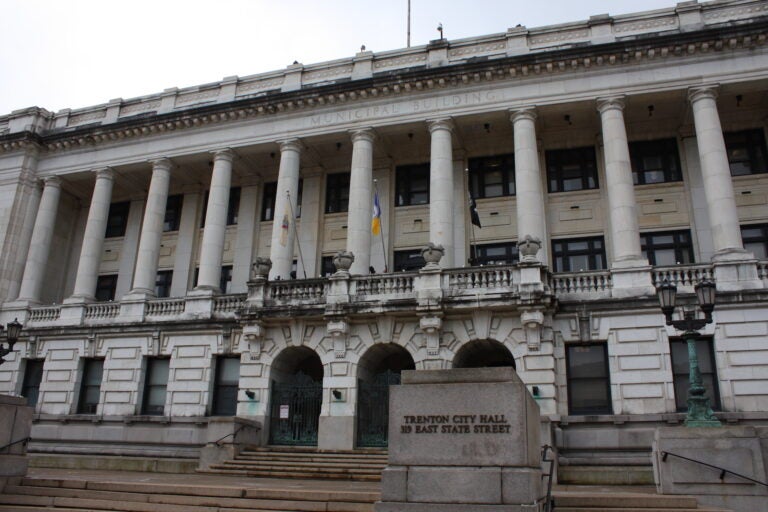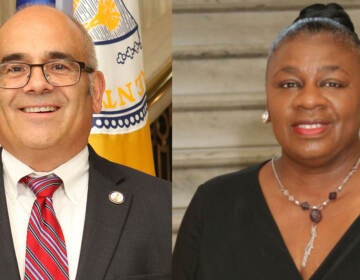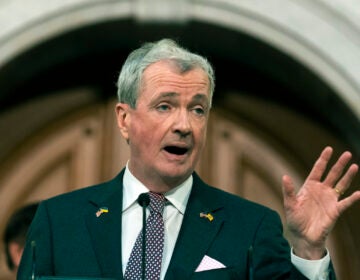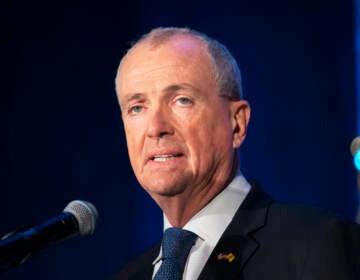Trenton approves $10 million overhaul of its emergency radio system
After nearly being shut down last month, New Jersey’s capital city will replace its emergency radio system for first responders which had been riddled with service issues.

File photo: Trenton City Hall. (P. Kenneth Burns/WHYY)
With a month and a half to spare before a court order expires, New Jersey’s capital city has approved a plan to overhaul its emergency radio system, which officials say has been unreliable.
Trenton City Council on Monday approved spending $10.1 million in American Rescue Plan funding to replace its 911 phone system and to move radio communications from the city’s police, fire, public, and water works to state police frequencies. Mayor Reed Gusciora said moving to those “superior” frequencies will make sure first responders are able to communicate on the scenes of emergencies.
“Trentonians can rest easy knowing that we have an agreement in place that will keep a state-of-the-art radio system online into the foreseeable future,” Gusciora said in a statement. “There is no doubt that this city deserves the best public safety communications system available.”
Trenton’s emergency radio system was nearly shut down last month by service provider MPS Communications over non-payment of services. The city council had balked at paying the more than $200,000 past due balance, citing the company had breached its contract because of serious system failures. For example, in 2019, an off-duty police officer working overtime as bank security attempted to report a robbery over the radio, but as The Trentonian reported, no one heard the officer’s call.
A Mercer County superior court judge ordered MPS Communications to continue providing service through the end of the year, while the mayor and city council continued working on a new plan to replace the city’s emergency radio system — a process plagued by ongoing infighting among the city’s leaders right up until Monday’s special meeting.
The plan that passed on Monday did so by a 4-0 vote. Council President Kathy McBride, Vice President Marge Caldwell-Wilson, and Councilwoman Robin Vaughn were not present and did not vote.
McBride said she had consented to the special meeting taking place, but contended the Gusciora administration knew “in advance” she would not be able to make it, because she would be in Atlantic City for the N.J. League of Municipalities annual conference.
Mayoral spokesman Will Skaggs said the administration was not aware McBride and Caldwell-Wilson were unavailable until after the meeting was scheduled. He added that the special meeting was held online and that the municipalities conference didn’t start until Tuesday.
“The Mayor and Business Administrator are also going to the event and were still able to attend the special meeting,” Skaggs said.
Gusciora said he was “grateful” to the four councilmembers who participated in the meeting, including Councilman Santiago Rodriguez “who dialed in from his vacation.”
In October, McBride said Trenton residents “deserve a state-of-the-art radio room” in explaining why she tabled a $4 million proposal from Gusciora to use American Rescue money to buy new radio equipment that was compatible with Mercer County’s 911 system and radio frequencies.
She proposed overhauling the whole system and moving to 800MHz frequencies already owned by the city, which would have cost at least $12 million, according to a report commissioned by the city council.
The new system approved by the council on Monday will take between 60 and 90 days to come online. The city was able to move quickly because they are using a state-approved vendor to buy the equipment.
WHYY is your source for fact-based, in-depth journalism and information. As a nonprofit organization, we rely on financial support from readers like you. Please give today.








